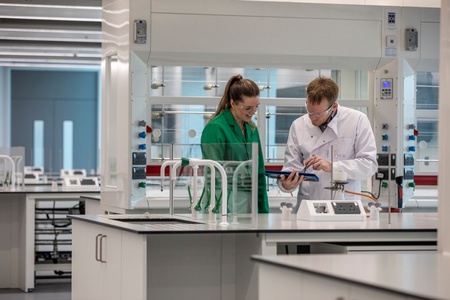This is a past event
Our second Climate and Sustainability Assembly will focus on the transformation of our laboratory spaces to be greener, cleaner and more efficient.
Labs are essential for supporting excellent, high-quality scientific research and teaching, but are highly intensive in using energy and resources like plastics. The Laboratory Efficiency Assessment Framework (LEAF) identifies that labs are responsible for approximately 2% of global plastic waste and use 3-10 times more energy than a typical office.
As we progress towards achieving our Aberdeen 2040 mission of Net Zero by 2040, it is important that we address energy, waste and material use in our laboratories while maintaining excellent research and teaching practices.
This assembly provides a forum for discussion, sharing ideas and developing University wide practices for improving sustainability in our lab infrastructure.
Colleagues from all disciplines that undertake lab work are welcomed.
Speakers

Lee Hibbett, Technical Manager, School of Pharmacy, University of Nottingham
Technicians, driving sustainability work
Biography
I’m a Technical Manager within the School of Pharmacy and I’ve just completed a 6-month secondment with the University of Nottingham sustainability team looking at making our lab areas greener and trying to get as many as possible LEAF accredited.
I have been a technician working at the UoN for over 32 years working in many different types of research labs. In that time sustainability has not really been on the University of Nottingham radar, so I’m happy to see that in the last few years there has been a big drive in this field.
I have always been passionate about sustainability and 3 years ago, I set up the Technical Sustainability Working Group to work with UoN sustainability, to bridge the gap between labs and estates. The working group consists of likeminded technicians across all fields and departments coming together, to find and look for new ways to improve and change sustainable practices in the areas they work and through this work I received the 2022 Green gown award for sustainable (staff) campion.
Maggy Fostier, Head of Environmental Sustainability in the Faculty of Biology, Medicine and Health, University of Manchester
Improving the sustainability of our practical classes using 6R - Review, reduce, reuse, refill, replace, recycle
Biography
Dr. Maggy Fostier took on the role of Head of Environmental Sustainability (ES) in the Faculty of Biology, Medicine and Health at the University of Manchester in June 2022. She is a teaching focused senior lecturer delivering many molecular biology practicals and running alternative types of final year projects. Her strategical plan for ES includes greening research laboratories and practical classes using tow tools (LEAF, 6R) and involving a maximum of UG and PG students.
Maggy will discuss 6R, a guide that the University of Manchester have developed in house with staff and students to reduce single use plastics in practical classes. It stands for review, reduce, reuse, refill, replace, recycle. It is simple to use by either staff, project students or GTAs and effective: pre-COVID, they reviewed 12 practicals and saved >37,000 items of plastic a year and £3000 a year. The main aim is to review all practicals with 6R by 2025.
- Venue
- Institute of Medical Sciences - level 7
- Contact
-
events@abdn.ac.uk

